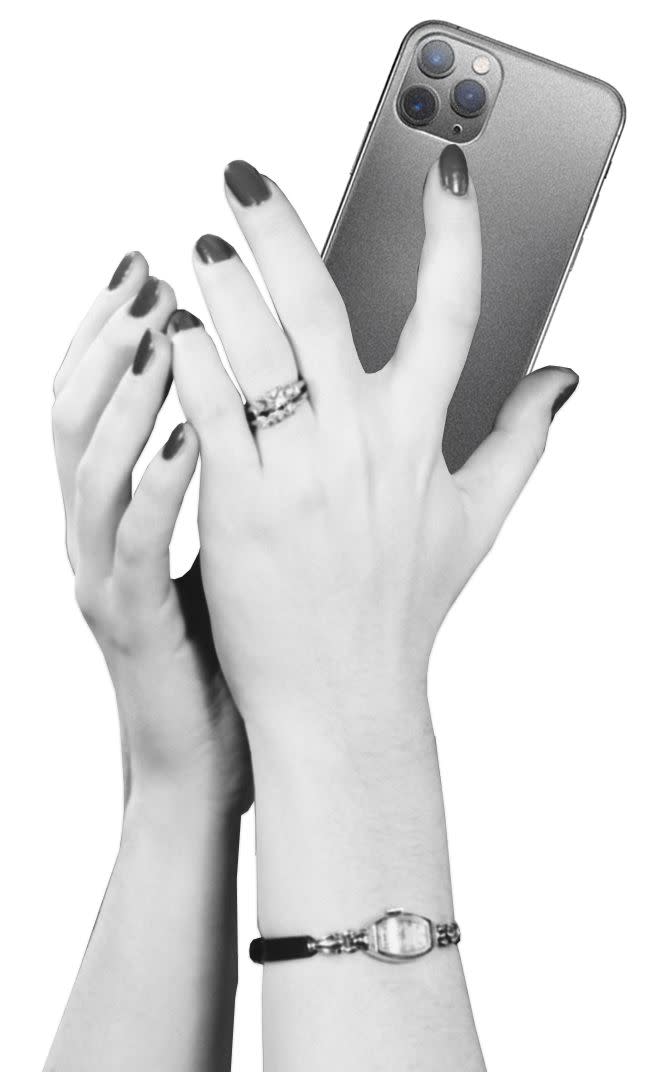The Psychopaths of TikTok

"Hearst Magazines and Yahoo may earn commission or revenue on some items through these links."

In Vic Path’s first TikTok, she speaks straight to camera, surrounded by the baby-pink walls of her childhood bedroom. Wearing an oversized T-shirt, a simple gold necklace, and her hair down, she ends the video with an invitation: “Follow along if you’re interested in hearing more about psychopaths.” Her video—which has accrued more than four million views since February—suggests five ways to tell if you’re friends with a psychopath. Is this person exceedingly charming? Do they always seem to get what they want? These could be signs, she says. After all, it’s a condition she knows intimately.
Vic Path—a stage name the 23-year-old uses—says she’s always felt emotionally detached from people. As a child, she enjoyed bullying, manipulating, and bossing around others. When she got older and became tired of her stable home life, Path says she repeatedly purposefully put herself in dangerous situations, like traveling alone, staying with strangers she met on the street, abusing drugs, and sleeping in public restrooms. After risking her own life multiple times just to feel less bored, Path decided to try therapy.
At 19, she was diagnosed with antisocial personality disorder (ASPD), which is characterized by a failure to conform to laws and social norms, repeated lying or conning of others, impulsivity, a lack of remorse, and basic disregard for or violation of others’ rights and safety, according to the most recent Diagnostic and Statistical Manual of Mental Disorders. Otherwise known as the DSM-5-TR, the manual is the standard classification of mental disorders used by U.S. mental health professionals.
Online, Path uses the term “psychopath.” While not identical to ASPD, psychopathy is also a mental disorder characterized by antisocial traits. It is not included in the DSM-5-TR, but some people with ASPD, like Path, use the term colloquially. “It’s much more recognizable,” Path says. “On social media, it hooks people.”
It certainly does. Path is just one of a handful of young creators who identify as psychopaths or sociopaths and have taken to TikTok to discuss their experiences. Path explains that one of her goals is to rebrand psychopathy and change public perception of those with ASPD; according to the Cleveland Clinic, ASPD affects up to an estimated four percent of adults in the U.S. “I get to help destigmatize a heavily misunderstood disorder,” Path says. “Every day, people leave ignorant and closed-minded comments on my videos, demonizing me for my disorder or trying to discredit me. But people also tell me I’ve changed their perspective, and those are the people I love to post for.”
It doesn’t hurt that these creators are also gaining fame and fortune from their videos. “My sole motivator is money,” Path freely admits. After she graduated from college and struggled to find a job, TikTok seemed like a good way to fund her “expensive” lifestyle. “ASPD was the easiest thing for me to market about myself, so that’s what I chose to center my social media presence around, and it’s working out beautifully,” she says. Though Path declined to disclose a specific number, she confirmed she makes the equivalent of a full-time salary from TikTok: “It’s a very comfortable wage.”
Another creator who goes by Cherry, or @thatplasticbitch, earns approximately $2,000 a month on TikTok, where she talks about what it’s like to be a “sociopath.” Sociopathy is no longer a formal diagnosis, and it isn’t used clinically, but some people with ASPD still self-identify as sociopaths.
Cherry says she was diagnosed with conduct disorder (a comparable diagnosis to ASPD that’s included in the DSM-5-TR and given to minors) at age 14, after beating up a classmate with a computer. She wasn’t surprised; she says she never cared about others’ feelings and described herself as selfish. “I was always a good liar, good at manipulating people,” she adds. “I could cry on cue. I was a good actor.”
As she’s gotten older and worked with more therapists, Cherry has learned to manage her symptoms. “I used to start chaos around me just to feel something,” she says. “Now, I’ve learned coping skills and things I can do when I need entertainment. I still don’t care for others’ feelings, but [now] I can see their side of things. It’s in my nature to be selfish, but I can work towards becoming a better person.”
Cherry also uses a stage name in an effort to keep from being doxxed or found by future employers, who she worries might use her diagnosis against her. Although she sees the risk in posting, she’s motivated by her mission. “I want people to understand what a sociopath actually is, because when they see us in books and movies, we appear crazy,” she says. “People think we go on killing sprees, or they think of Ted Bundy. I want to show them we can be good people.”
Patric Gagne has a similar aim. Diagnosed with sociopathic personality disorder in her 20s, Gagne wrote a bestselling memoir about growing up as a sociopath. “I think it’s amazing these young women are spreading the word,” Gagne says. “The younger you are, the more receptive you are to treatment for these disorders. Had I had someone like that in my life when I was younger to help me understand my diagnosis and seek therapy, it would have been a complete game-changer for me.”
Even so, some professionals are concerned social media will lead to people self-diagnosing personality disorders. “This happened originally with ADHD,” says Dr. Paul Losoff, a clinical psychologist who’s worked with ADHD patients for over 15 years. “As the trend [of sharing ADHD diagnoses on TikTok] grew and more information got out there, more people were falsely self-diagnosing. You can’t just fill out a bunch of questions and discover that you’re a psychopath or sociopath. A licensed professional needs to spend hours getting to know you.”

It can also be confusing for the average viewer to accept a creator’s purported mission to destigmatize a disorder, while watching them describe extreme antisocial tendencies. On the first page of Gagne’s memoir, she writes: “I’m a liar. I’m a thief. I’m emotionally shallow. I’m mostly immune to remorse and guilt. I’m highly manipulative.” According to Dr. Abigail Marsh, a professor in the Department of Psychology and the Interdisciplinary Program in Neuroscience at Georgetown University and a leading researcher in psychopathy, there’s a fine line between stigmatizing a mental health disorder and punishing bad behavior. “If you persistently engage in behaviors that exploit or harm others or violate their rights, that should be stigmatized,” Marsh explains.
But, like these creators emphasize, Marsh also notes that many people have developed strategies to manage said behaviors; Gagne explains that she now knows how to redirect her destructive impulses. People with ASPD might sit next to you at work, come to your family dinners, or pop up on your For You Page. “It’s not the traits themselves that are the problem for any disorder,” Marsh says. “It’s how the traits manifest behaviorally and how well the person has learned to manage them.”
The challenge is that it can be difficult for people with ASPD, because there is little research about treating these disorders, Marsh says. In fact, she notes, clinical psychology PhD programs in the U.S. are heavily biased in favor of treating depression and anxiety, with no requirement that candidates train to treat people with ASPD. Marsh’s nonprofit, Society for the Prevention of Disorders of Aggression, aims to bridge this gap by helping those affected by psychopathy understand their disorder and treatment options, including psychotherapy and pharmacotherapy.
Cherry says she’s discovered a robust community of other creators with personality disorders, whom she now calls her closest friends. “I like these people, because they don’t have a moral compass,” Cherry explains. “My best friends are a sociopath and a narcissist. They don’t judge me.”
Having lived with the knowledge she’s different most of her life, Cherry is proud of her online presence. “People comment tons of positive things, saying I’ve helped them understand their sociopathic family members or that they now feel more empathy for sociopaths,” she says.
Still, observing creators like Path and Cherry can feel conflicting; it’s easy to walk away from one of their videos, or interviews, and not know what to think—about them or their intentions. But while viewers work out what shade of gray to paint them in, they’ll keep posting. And almost certainly, we’ll keep watching.
You Might Also Like
